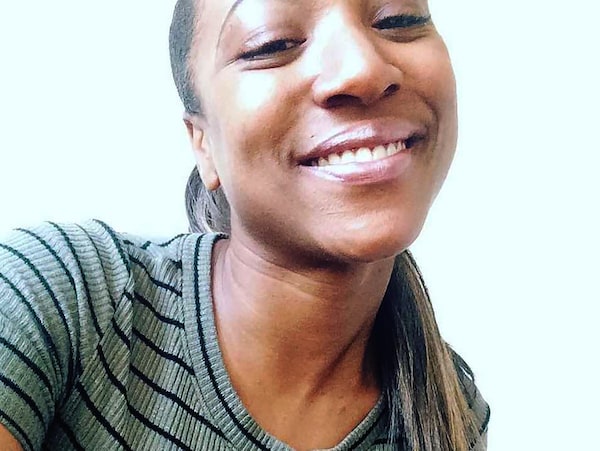The family carries Regis Korchinski-Paquet's casket to a hearse in Toronto on Thursday.Galit Rodan/The Globe and Mail
Peter Korchinski walked solemnly into Tom’s Place this week to look for a dark suit for his daughter’s funeral.
A greeter handed him a surgical mask and hand sanitizer and referred him to a salesman, who eyed the customer’s white T-shirt. On the front, it bore the face of a young woman he recognized from the news along with a hashtag, #JusticeForRegis. On the back was a raised fist surrounded by the words BLACK LIVES MATTER.
He had some notion of who this customer was and peppered him with polite questions without the usual small talk. Black or brown shoes? Pocket square? What colour tie?
It was all too much.
“I’ll let you decide,” said the customer, Mr. Korchinski, lowering his mask to be heard. “Just do the best you can.”

On May 27, Regis Korchinski-Paquet, seen here, fell to her death in Toronto while in the company of police who had been called to help her. The province’s police watchdog is investigating the incident.handout/The Globe and Mail
On May 27, his daughter, Regis Korchinski-Paquet, fell from a 24th-floor balcony in Toronto while in the company of police who had been called to help her. The province’s police watchdog is investigating. A private funeral was held on Thursday.
In the days since her death, thousands of people have invoked her name during marches against anti-Black racism and police abuse in cities across the country. Her family supported those demonstrations, but with reservations about her manner of death overshadowing the vibrancy of her life.
“I just wish my sister was here and wasn’t the name behind this movement, to be honest with you,” said her eldest sister, Shyna Beals. “And I want people to know she’s more than a hashtag.”
She was born on Oct. 4, 1990. Regis is Mr. Korchinski’s middle name. Some friends and family said it was a boys’ name and urged the couple to change it. But her mom, Claudette Beals-Clayton, insisted.
Regis Korchinski-Paquet, left, at her parents' wedding. Born in 1990, Regis came to value her family upon entering high school. 'When I got into Grade 9, she went around saying "Nobody better mess with my brother,"' her little brother, Reece, says.family handout/Handout
She had two older sisters and, eventually, two younger siblings, a sister and a brother. An active child, Regis often needed night-time car trips to get to sleep. Later, she parlayed that energy into Ukrainian dancing and gymnastics, winning countless competitions.
In high school, she put family first. “When I got into Grade 9, she went around saying ‘Nobody better mess with my brother,’ ” said her little brother, Reece Korchinski-Paquet. “And they didn’t. Without that I would’ve had a hard time.”
From an early age, Regis had questions about race. Her dad was a direct descendant of Ukrainian settlers and her mom was Black with Mi’kmaq ancestry. “I’m white and she’s darker than all my other kids, so she’d ask ‘What’s that all about?’ ” Mr. Korchinski said. If her parents couldn’t supply answers, she consulted her Ukrainian grandfather, her Dido. “Race has always been a big issue for me feeling like I need to be a different colour to fit in," she recounted in a Facebook post. "My Dido helped me to see that although I am darker skin I am the same as anyone because in Gods eyes each of us are equal.”

Around five years ago, Ms. Korchinski-Paquet developed epilepsy, which affected her mood.handout/The Globe and Mail
After high school, Ms. Korchinski-Paquet held an array of jobs, working for a computer security company, then a deli counter. But around five years ago, she was diagnosed with epilepsy and found it difficult to maintain a job. She had a seizure at work and another on a streetcar.
The seizures came every couple of weeks. There were warning signs when one was about to strike. She would become irritable and demanding. Afterwards, she would feel exhausted.
The condition only strengthened her appreciation for family. On a sibling WhatsApp group chat, she was the first to post every day with an upbeat, “Good morning, I love you.”
“We heard that every morning,” said Ms. Beals, the eldest sibling. “She was full of compliments."
On Aug. 9, 2017, her Dido died and she had three back-to-back seizures. At the hospital she angered some police by telling them to get away from her. It would take her white father to defuse the situation.
“I could tell they were getting angry and wanted to do something,” Mr. Korchinski said of the police. “I had to explain that she’s had a seizure, she’s not herself right now. And the cops would always listen to me. And I was always there for her. And then this time, I wasn’t there. And that’s what’s really bugging me right now.”
On a warm Wednesday morning two weeks ago, Ms. Korchinski-Paquet suffered another seizure. When the symptoms abated, she shared a Caesar salad and some lemonade with her dad. Groggy and hot, she reclined on the couch. Her dad got a fan and positioned it to blow on her face. Then he left for Markham, just north of the city, to pick up a dehumidifier at a family member’s home.
He was there, 45 minutes away, when the call came. Ms. Korchinski-Paquet’s mother had contacted police to help calm her distressed daughter and take her for mental-health treatment, according to a family statement. Ms. Korchinski-Paquet died during the interaction.
“A call for help ended with my sister dying,” Ms. Beals said.
With a navy blue suit selected, Mr. Korchinski emerged into the sun outside Tom’s Place and tore off his surgical mask. He needed to breathe. Shyna, Reece and two grandchildren joined him on a nearby park bench. They laughed and cried telling more Regis stories, like the Christmas she scoured Toronto toy stores for Shopkins to give a niece in Nova Scotia, where shops had run out of the toys. Or her compulsive cleanliness. Or her recent longing for motherhood. “She started talking about having kids just in the last six months,” Ms. Beals said.
And they talked of how hard it was to hear people chant her name during a peaceful march and how great it was that their Regis had brought all those people together just like she’d always done for the family.
“It’s tough to hear name, but it’s also helpful,” Mr. Korchinski said. “I’ve seen the mayor and the police chief just refer to her as a 29-year-old woman. Her name is Regis. Just say it. Just say it.”
At a family funeral on Thursday, Mr. Korchinski listened in his new suit as a pastor spoke of Ms. Korchinski-Paquet’s devotion to the church and her mother sang a hymn. The most heartbreaking moment for him came when his granddaughter Nalaya stood and addressed Ms. Korchinski-Paquet directly. “I was crying so much I didn’t catch everything,” Mr. Korchinski said. “But she said ‘Thank you for telling me you love me and for telling me that I’m a strong, Black woman.’ ”
Regis Korchinski-Paquet's family, from left, brother Reece Korchinski, sisters Shyna Beals and Renee Korchinski-Paquet, mother Claudette Beals-Clayton and father Peter Korchinski, embrace after her funeral in Toronto on June 11, 2020.Galit Rodan/The Globe and Mail
 Patrick White
Patrick White